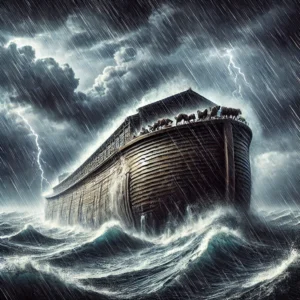 Just before the biblical narrative about God judging the earth with a flood, we encounter an interesting verse that some have interpreted to mean God has established a maximum of 120 years for the lifespan of any human. Let’s look at this verse:
Just before the biblical narrative about God judging the earth with a flood, we encounter an interesting verse that some have interpreted to mean God has established a maximum of 120 years for the lifespan of any human. Let’s look at this verse:
“Then the Lord said, My spirit shall not abide in mortals forever, for they are flesh; their days shall be one hundred twenty years.” – Gen. 6:3
Some have proposed that God determined humans could not live past the age of 120 years. This is an interesting interpretation, and it could be accurate if this verse stood apart from the rest of the context. But when we broaden the context to read the surrounding verses, we find ourselves in the middle of a narrative about Nephilim, wickedness, and a great evil within the hearts of humans. God was not happy with the current state of humanity and decided to remove all creation from the earth except for Noah, his family, and those he was able to fit into the ark (Gen. 6:7-8, Gen. 7:1-3). In context, it is most likely that God determined the flood would occur in 120 years, but let’s look at the plausibility of the lifespan interpretation to see if it fits the history that takes place after the flood.
Genesis 11 reveals that many of Noah’s descendants in the line of Shem lived long beyond this 120-year mark. Shem lived to be 600, Arpachshad made it to 438, Shelah was 433 when he died, and the list in this passage continues for five more generations who broke the 120-year mark. We also know Abraham lived to be 175 (Gen. 25:7), Isaac lived to be 180 (Gen. 35:28), and Jacob lived to be 147 (Gen. 47:28). So, from the time of the flood until the death of Jacob, a timespan of approximately 600 years, we have at least 12 generations of people who lived beyond 120 years. It is not until Joseph that we find someone in this lineage not making it to the 120-year mark (Gen. 50:26). Even apart from the context of the pre-flood narrative in Genesis 6, there is a plethora of biblical evidence that God did not limit the lifespan of humans. The only other plausible interpretation is that God was establishing a timeline for when the flood would occur.
Looking further back at Noah’s life, we find that he was 500 years old before his three sons were born (Gen. 5:32). We also know he was 600 years old when the flood began (Gen. 7:6). We do not know the timeline of God’s statements in Gen. 6:3-7, but if he made this statement when Noah was 500, we would have a 100-year timespan to work with until the flood began. If God made this statement twenty years earlier, it would fit the flood timeline interpretation perfectly.
Everything listed above is good corroborating data that negates the lifespan interpretation, but we do not really need all this numerical data. The context of the passage is the key piece to zero in on. Verse 3 tells us, “their days shall be one hundred twenty years” and as we keep reading we find God’s initial statement about the coming destruction of the earth’s inhabitants in v.7. These verses cannot be separated, especially after Noah is referenced in v.8. In context, God is pointing out the massive amount of evil taking place on the earth and issuing his judgment for a great reset. Fortunately for Noah, and all of us living today, God’s plan for humanity did not end with the flood.